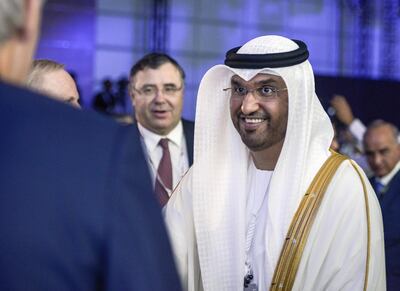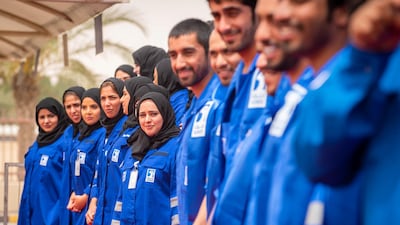The drilling partnership with Baker Hughes ties into Adnoc's ambitions to viably explore new sources of oil and gas, opening the door to a windfall for the UAE energy industry that could be a repeat of the dramatic US shale boom.
Abu Dhabi has been a stable and relatively easy place to extract hydrocarbons from over the last six decades. However, as its existing fields mature, it becomes tempting to explore further and deeper. According to the US Energy Information Administration, the UAE has 22.6 billion barrels of recoverable shale oil and 205 trillion cubic feet of recoverable shale gas. Exploring these assets brings with it additional risk and expense.
Extracting tight oil and shale gas requires more advanced techniques, such as hydraulic fracturing – colloquially known as fracking – and the drilling of a higher number of wells. As they say, time is money, and Baker Hughes has a proven track record of minimising the duration of the drilling process.
_______________
Read more:
Timeline: Adnoc's transformation under CEO Sultan Al Jaber
Baker Hughes to pay $550 million for minority stake in Adnoc's drilling unit
Middle East needs to focus on making new hydrocarbon discoveries
Adnoc signs contracts for development of Bab and Upper Zakum fields
_______________
Competition in the US shale industry, such as in the 3.45 million-barrels-a-day-producing West Texas Permian Basin, has spurred a drilling revolution, resulting in ongoing improvements in speed and efficiency. Amid the shale boom – which was initially spurred by high oil prices - the US has drastically reduced its need for imports, begun itself to export crude and the price of petrol at the pumps has also been cut.
Opec forecasts that 15 per cent of all global output by the late 2020s will come from tight oil sources, such as US shale. The revolution has been more of a creeper-vine in this region up to now but there are signs it might be ready to flower. In April, Bahrain said it had made a sizeable shale oil discovery and BP has started unconventional gas production at Oman's Khazzan field.
According to Tom Quinn, a senior research analyst of Middle East upstream at Wood Mackenzie, there is potential for tight oil and gas in this region but it is early days.
“The US has been able to succeed by having a competitive sector, well developed services and expertise, as well as huge volumes of data to drive efficiency and reduce extraction costs,” he said. To replicate this here, there are several hurdles to overcome, including the need to build up the expertise and facilities required to develop these resources, Mr Quinn said.
Baker Hughes should be able to fast track Adnoc’s drilling capabilities and give a huge boost to the commercial potential of these unconventional resources for the first time in the UAE. Its chief executive Lorenzo Simonelli pretty much said exactly that on the announcement of Baker Hughes taking a $550 million stake in the company. The deal will also “accelerate overall market growth”, he said.
The expansion of Adnoc Drilling’s range of services thanks to Baker Hughes, will mean it can itself compete to win the projects to explore untapped reservoirs. Adnoc Drilling will then in turn sub-contract services to the private sector, creating new opportunities for the best and brightest companies. This is on top of the expected increase in conventional drilling activity by 2025.
Adnoc's own talent pool is also expected to benefit from these changes and the overall effect will be to ramp up the process of turning the UAE's upstream sector into a more competitive and dynamic environment, which has been ongoing since Dr Sultan Al Jaber took over as Adnoc's chief executive in 2016. This all ties in to the broader changes that have been going in the country in the last few years.

The UAE has been working hard to diversify its economy away from a reliance on the sale of crude through a number of reforms and initiatives. Adnoc has played its part and is building more value in the downstream sector of petrochemicals, for example. It may then seem odd that it is also plotting a new era of growth for the business of getting oil and gas out of the ground. After all, is this not an aspect of the business that appears to be either on the decline and in no need of an overhaul - given the country’s position as a top global crude producer?
The main point here is that the future of production in Abu Dhabi will be far different to what it has looked like over the last half-century. It has to be profitable no matter what the price of a barrel of oil is. This thinking is underlined by the recent competitive bid round for oil and gas exploration and production licenses in Abu Dhabi. Bringing in a partner like Baker Hughes within the Adnoc group takes this approach forward and also begins to solidify the vision for what will be an exciting new phase for the local energy industry.


